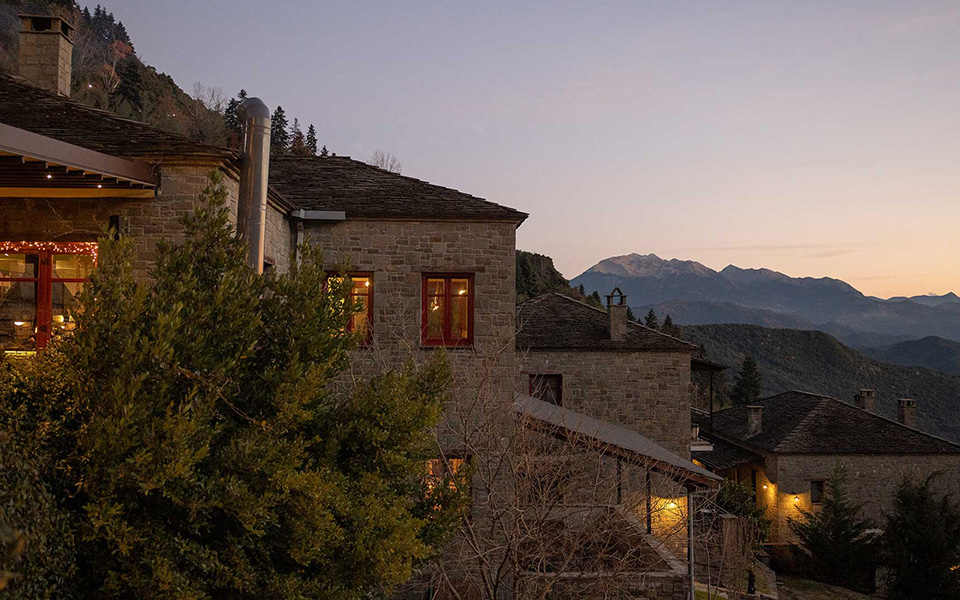Rouista Tzoumerka Resort
The Rouista Tzoumerka Resort, a hotel in Vourgareli, Arta, is named after one of Tzoumerka’s highest peaks, Rouista, which rises to a height of 2,200 meters. Siblings Eleftheria, Andreas, and Marina, along with Marina’s spouse Dimitris, abandoned their jobs in the large cities of Athens, Kalamata, and Ioannina in order to return to their homeland. “Rouista was my father’s idea; he used to tell us at the dinner table that he imagined himself in a hotel. He did nothing about it; it was one of those dreams that you simply share with others. We put it off for years until one day we decided to make his dream a reality,” explains Eleftheria Tyrologou. Along with her sister Marina, Eleftheria is responsible for reservations and the driving force behind Rouista.
“Our father had something a little different in mind, like an old-fashioned hotel. However, it eventually became six buildings built on a hillside. We wanted to build our own small village within the larger one,” Eleftheria explains.
Info
Vourgareli, Arta, Tel. (+30) 26850.222.00, rouista.com, double rooms with breakfast from 95 euros.
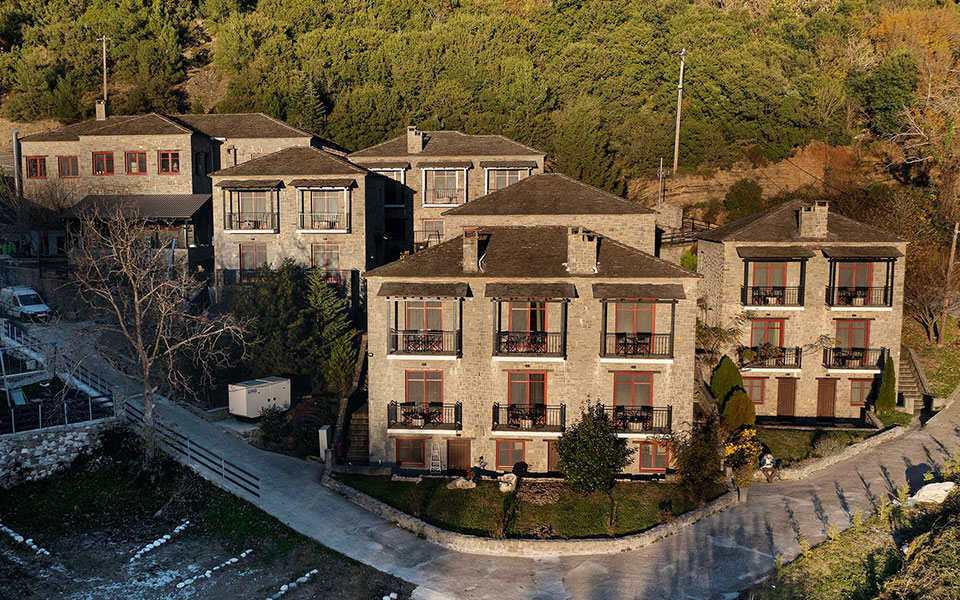
© Dimitris Tosidis
Rouista’s main materials are stone and wood, and it has 21 rooms – including double, triple, and family rooms, as well as maisonettes – two of which are accessible to people with disabilities. The 50-square-meter master suite is especially striking, with its circular layout and organically connected interior spaces, wooden ceiling with beams, energy-efficient fireplace, and oak wood floors. The bedroom has a large double bed, which is separated from the living room by two white curtains.
The standard 25-square-meter double room is even more impressive, with its light-colored decor, wooden ceiling, desk, espresso machine and coffee supplies. It also has a table and chairs outside the door that evoke the feel of a village courtyard.
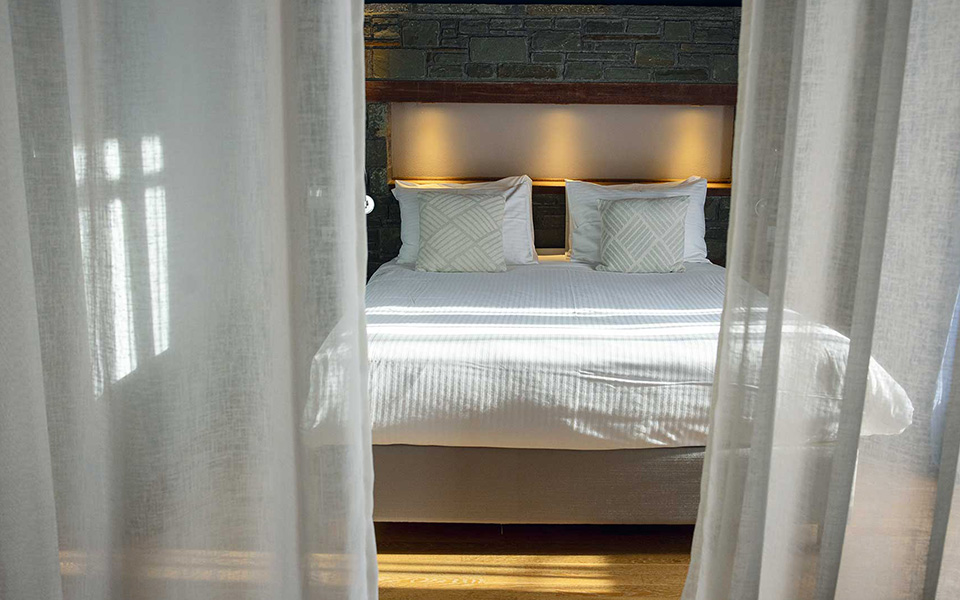
© Dimitris Tosidis
Thodoris Lingas, an Ioannina-based decorator, was a key figure in shaping the hotel’s identity. “Thodoris’ first priority was to make the rooms functional. He made an initial assessment of what fits and what does not, and then let us decide.” Choosing the fabrics, colors, and other small decorative touches, such as the wooden coat hangers, became a collaborative effort.
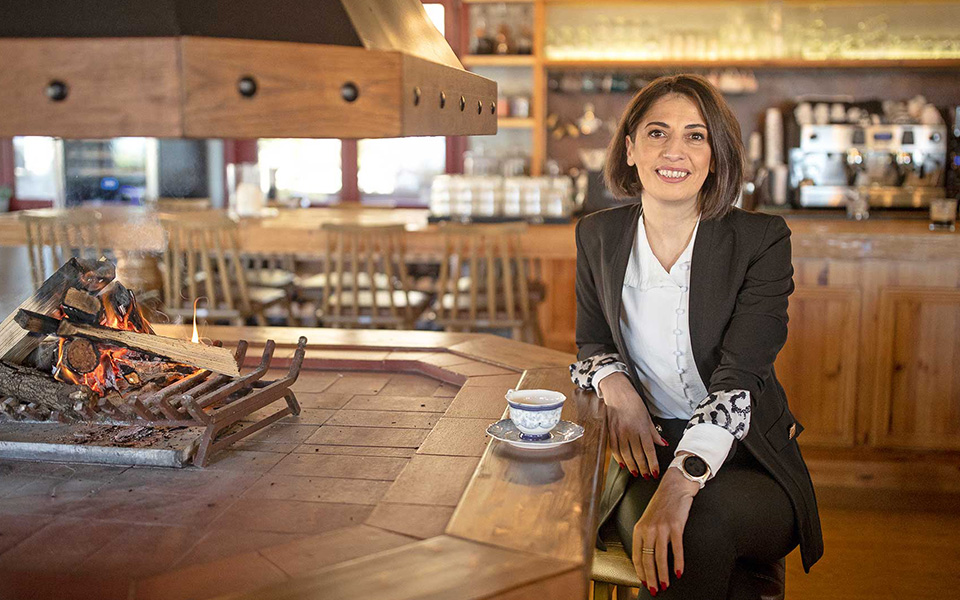
© Dimitris Tosidis
A gym and spa are in the works, but there are already several common areas, including the conference floor, the outdoor playground, the outdoor ping pong table, the open basketball court, and the playroom—which is outfitted like a kid’s playground and features a projector for kids’ movies and table football.
Breakfast is served on the lower level, and coffee is served on the upper floor by the fireplace. Sotiria, the owners’ mother, takes a hands-on approach to breakfast preparation, crafting jams, breadsticks, and a variety of other treats. She also gives lessons on how to make traditional pies from Epirus.
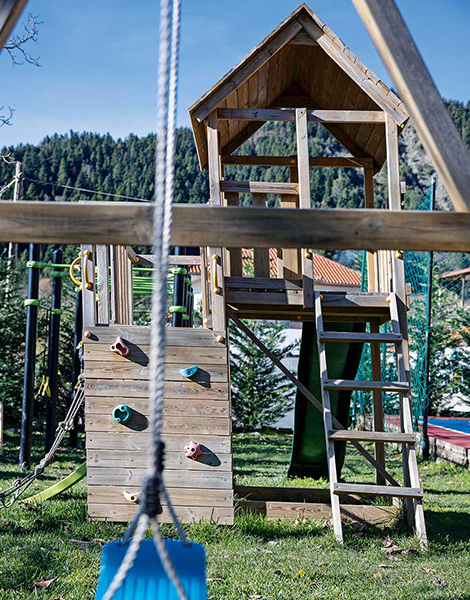
© Dimitris Tosidis
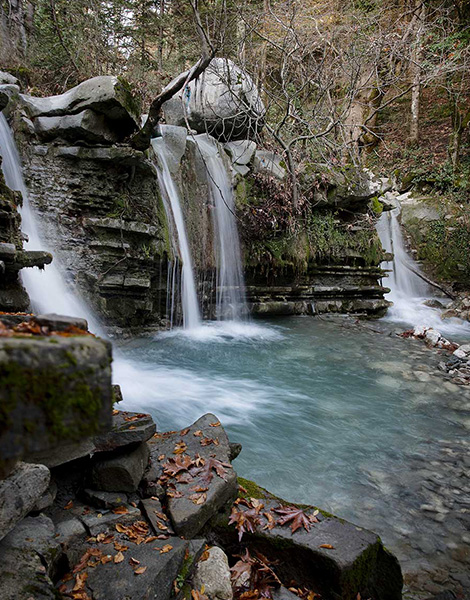
© Dimitris Tosidis
The breakfast area also includes the Bostani restaurant, which sources some of its ingredients locally. Two chefs, Fotis from Tetrakomo and Konstantinos from Trikala, are in charge of the kitchen and have created an exceptional and well-thought-out menu that features familiar Mediterranean flavors with a modern twist, including vegetarian, vegan, and gluten-free options, as well as meat dishes, pasta, legumes, and must-try smoked trout dolma and onion sauce dish.
The wine list features wines from Greek vineyards, including whites, reds, rosés, and sparkling wines. Labels from nearby wineries, such as Ktima Minis from Prodomi Paramythias and Ktima Lampraki from Tzoumerka, are well worth a try.
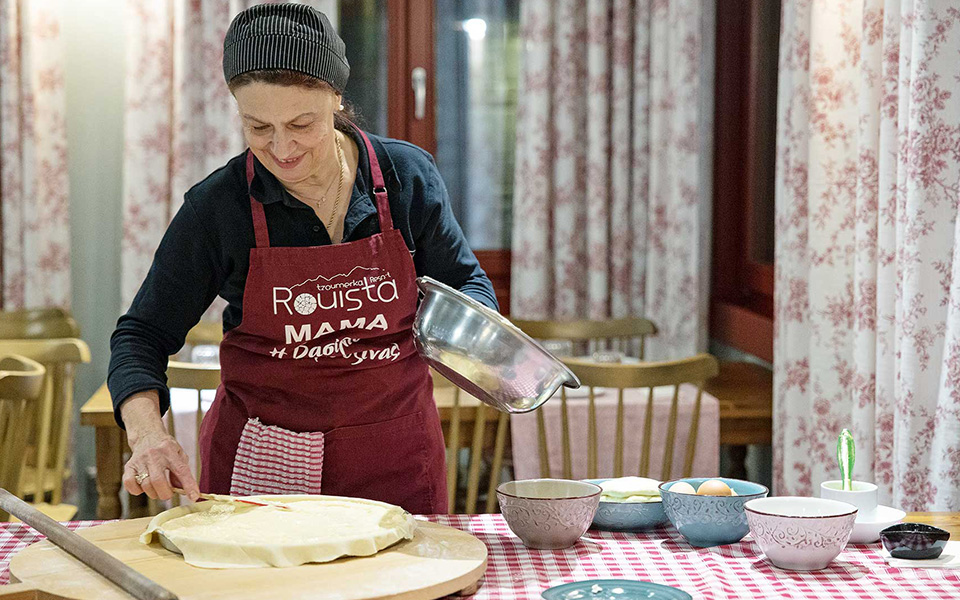
© Dimitris Tosidis
It’s also worth exploring the surrounding area, especially Vourgareli, one of the most vibrant Greek mountainous villages. Cross the Neraidogefyro bridge, look for the stairs leading to the picturesque square and then continue to the Archonti and the – far more impressive – Krystallo springs. The stunning Byzantine Red Church, with frescoes depicting founders Yiannis and Maria next to the Virgin Mary, is a short five-kilometer drive from the village. Travel a little further until you reach Kypseli, the birthplace of the great Greek photographer Kostas Balafas, who introduced post-war generations of Greeks to the harsh reality of life in Epirus.
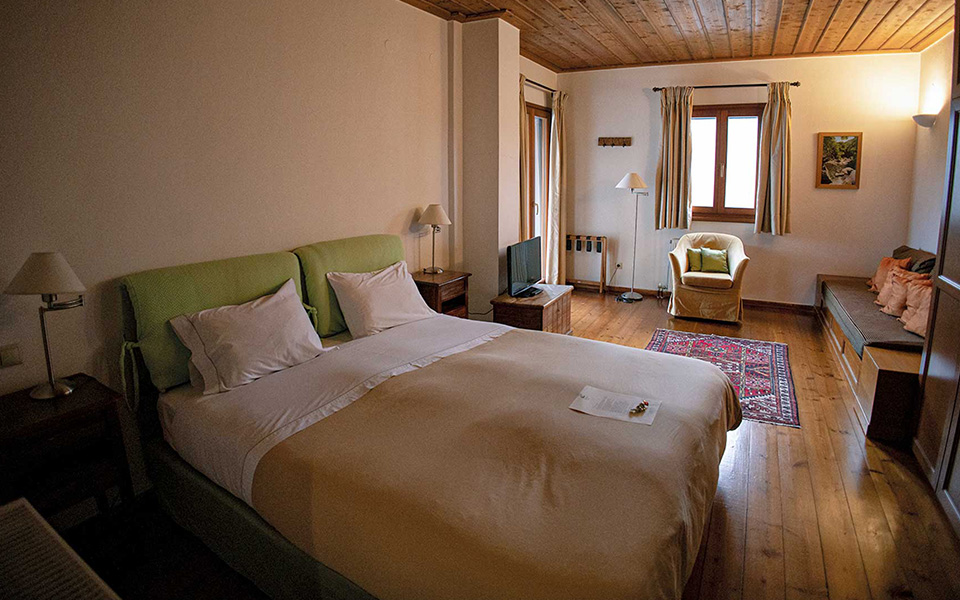
© Dimitris Tosidis
Xenion
Tatiana Vourtsi has been running the Xenion guesthouse for the last five years. Her story is unique; although originally from Zakynthos, she considers Greek hotels to be her homeland. As the daughter of a hotel manager, she grew up in hotels and each hotel room served as her home. She has worked in every position in the hotel industry since she was very young. All of her experience taught her that accommodations must be “human and friendly to guests,” just like Xenion.
The guesthouse, which was created by musician Giorgos Merantzas in the settlement of Tsopela, is located two kilometers from Pramanta, deep in the heart of Tzoumerka’s natural environment. He loves Tzoumerka and the Xenion. He left when he was 16 years old, but he never lost touch.
Info
Tsopela Ioannina, Tel. (+30) 26590.623.50, xenion.gr, double rooms with breakfast from 110 euros.
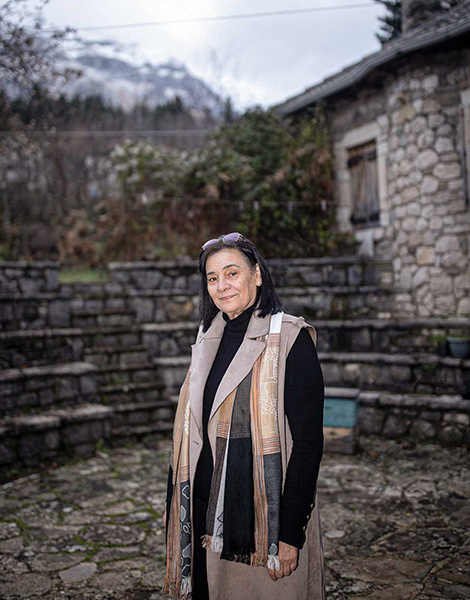
© Dimitris Tosidis
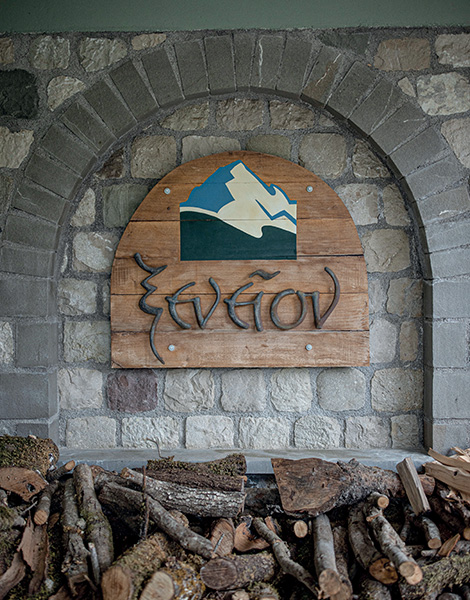
© Dimitris Tosidis
The living room with the fireplace, the smells from the open kitchen, and the staircase leading to the rooms all make you feel comfortable and at home. “This monastery-style, communal wooden table is intended to accommodate all our guests. As they eat breakfast together, they get to know one another and end up becoming friends. On winter afternoons, after their walks, we light the fireplace, and that’s when the tsipouro flows into the late evening.”
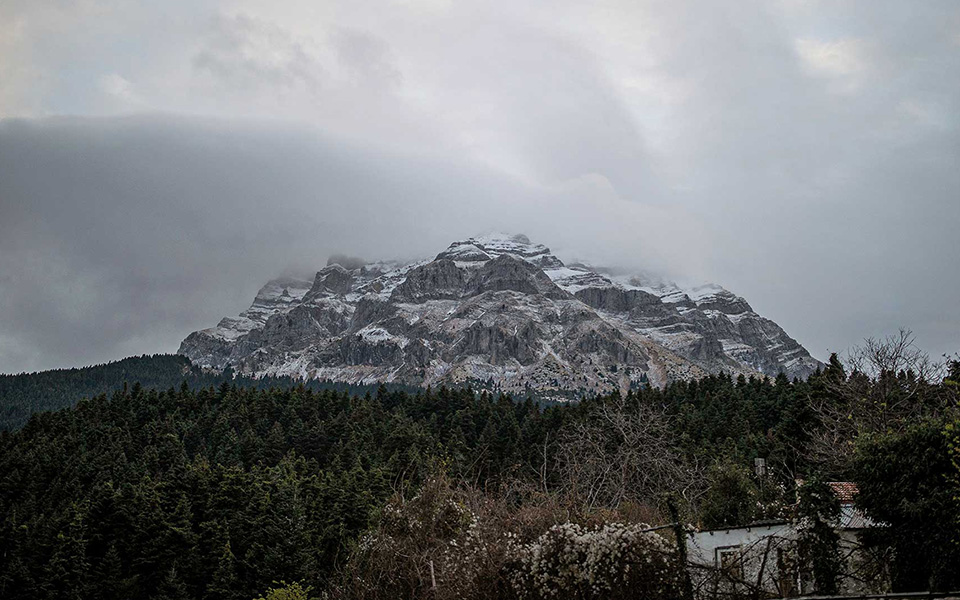
© Dimitris Tosidis
Xenion offers seven single rooms for up to three people, as well as family suites with a double bed, a living room with a fireplace, and built-in sofa beds.
Tatiana and new team member Angeliki prepare breakfast, which includes omelets, boiled eggs, homemade jam made with locally grown fruits (orange, banana, peach, or kiwi), rice pudding, custard cream and vanilla cake.
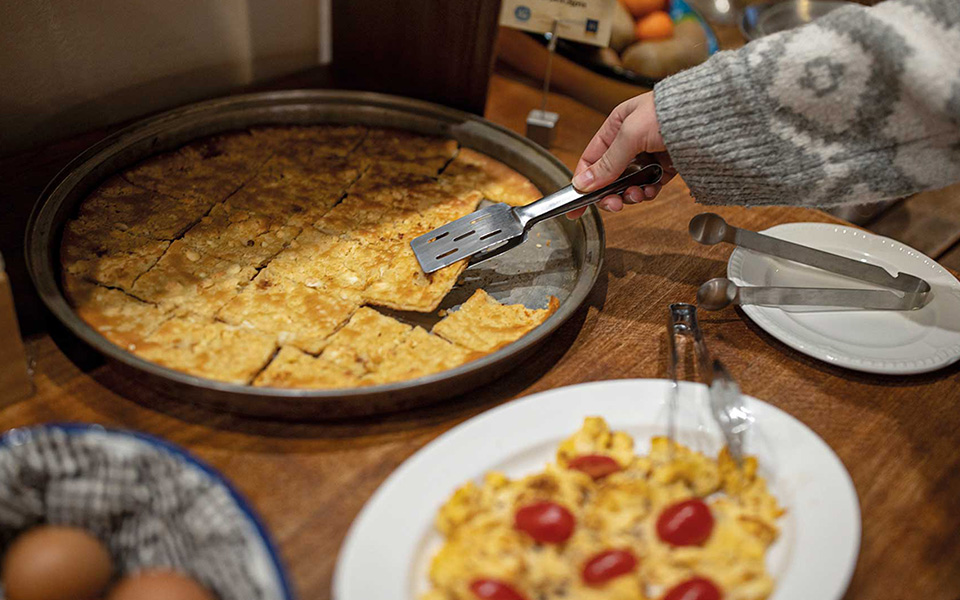
© Dimitris Tosidis
The rooms have names such as Erato, Vasiliki, Dimitra, Areti, and Georgia. Who are these women? “They were actual village residents who had romantic relationships prior to marriage and were targeted by the local community. As a tribute, Merantzas gave the rooms their names.” These are the kinds of beautiful stories you hear from the beautiful people at Xenion.
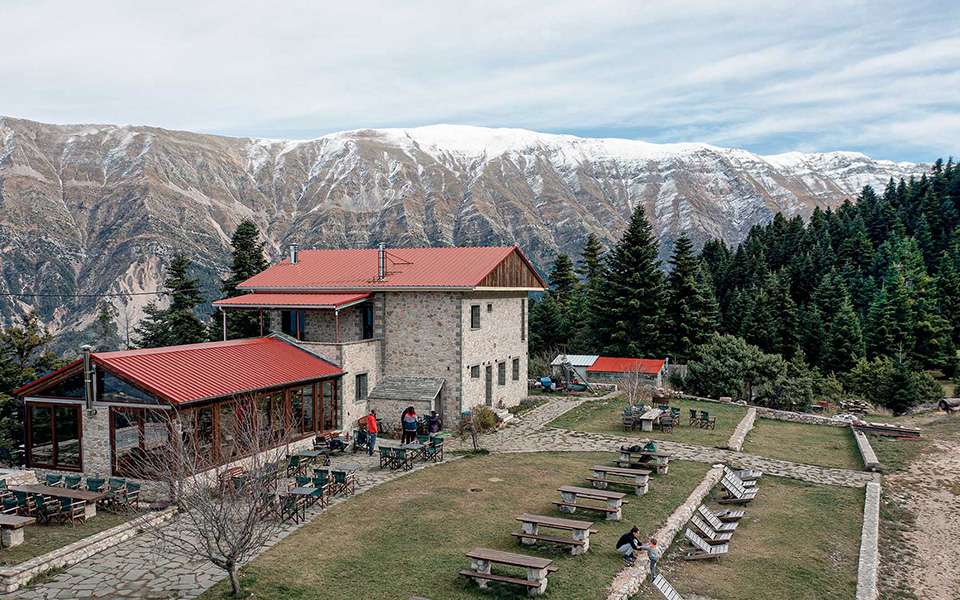
© Dimitris Tosidis
Pramanta Refuge
We meet Pola Markozi and Babis Triantafyllou at the Pramanta Refuge, located in a fir forest at the foot of Mount Stroggoula at an elevation of 1,260 meters. It is a popular destination for hikers, walkers, and travelers from all over the world, full of mountain ranges, rivers, and streams. “To the northeast, we have Kakarditsa; to the north, Lakmos (Peristeri) with the traditional settlements of Syrrako and Kalarrytes; to the northwest, Tymfi, with the peaks of Astraka and Gamila; further west, Mount Mitsikeli of Ioannina, and beyond that a wonderful sunset. Below us flows the Melissourgiotiko stream, which meets the Kalarrytikos, and together they feed the Arachthos, the river of Tzoumerka,” they explain.
Eighteen years ago, the couple arrived at this magnificent location, which so beautifully captures the grandeur of mountainous Greece. Both from Athens, they decided to rent an abandoned refuge from the Municipality of North Tzoumerka and raise their family away from the chaos of the city. It was an emotional decision, not one that was carefully considered. “We sat down and thought about what this place had to offer. A health center, a pharmacy, a town hall, and a school. You don’t really need anything else.” Indeed, Pramanta, located just 5.5 kilometers from the refuge, is one of Tzoumerka’s largest and most vibrant villages.
Info
Isioma Plateau, Pramanta, Ioannina, Tel. (+30) 26593.006.45, tzoumerkarefuge.com, €15 per overnight stay in a shared dormitory.
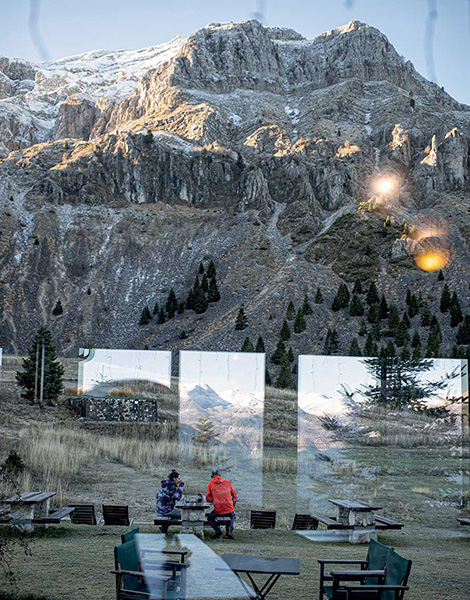
© Dimitris Tosidis
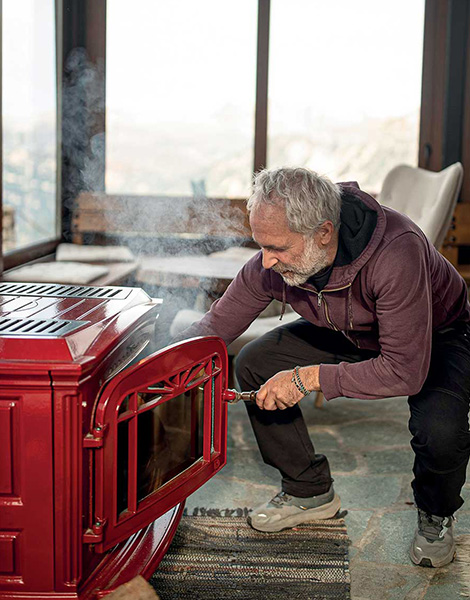
© Dimitris Tosidis
Today, the situation is very different from when they first started, particularly in the last three and a half years, when the refuge was completely renovated with the help and financial support of the municipality. However, the most significant change was that the refuge now has drinking water, after years of having to use a hunter’s tap 600 meters away. Having access to water also inspired them to create a therapeutic bath. “It’s simply a dream to dip your warm and swollen feet in a river after a long hike. We use cold water from the waterfall. In the summer, overnight guests can also take a dip to cool off. However, the bath is not there for entertainment; you don’t just go to the pool to unwind on your towel.”
In refuges like this one, which are easily accessible, you get both day visitors and overnight guests. External visitors can enjoy coffee and snacks from ten a.m. to sunset. The menu is specific and straightforward, lacking the variety of a restaurant. It includes homemade lemonade, beverages, toasties, galaktoboureko (custard pudding with syrup), and chocolate cake; cooked dishes such as chicken soup, gemista (stuffed vegetables), beef stew with orzo pasta, or pastitsio have to be ordered ahead of time.
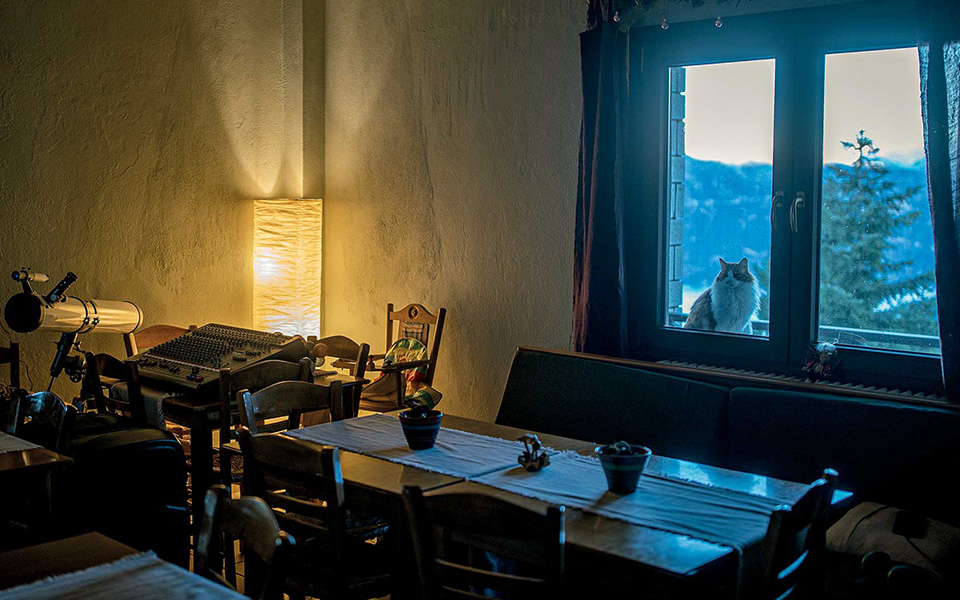
© Dimitris Tosidis
There are also rules concerning overnight stays. Given that the accommodations are communal (three mixed dormitories, each with its own bathroom, for a total of 26 beds), you must respect your neighbors. The beds have pillows and blankets, but guests must bring their own sheets, sleeping bags, and towels. Pets are welcome in the living room but not in the rooms.
Even though the above may sound restrictive, in reality it isn’t. It’s simply the rules of a way of life that is unique in this day and age. Pola and Babis live in a 9-square-meter room with their two children (“parents in a double bed, kids in bunk beds”). The mountain slopes greet them as soon as they awaken in the morning. They spend their days in a mountain environment rich in herbs, mushrooms, and wildflowers, which is also home to partridges, eagles, vultures, hares, foxes, and wild boars. From time to time, they see wolves in their yard. “You might see us standing over a flower with guests or friends, waiting for it to bloom. Every day feels like a nature documentary.”

